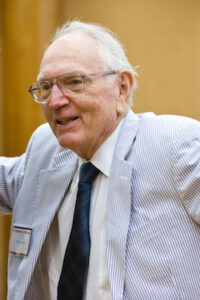 Highlighting a Local Activist’s Role in Securing Civil Rights
Highlighting a Local Activist’s Role in Securing Civil Rights
On September 24, 2014, Paul M. Gaston, professor emeritus of history at the University of Virginia, captivated a large audience with his guest lecture on his experience as a local activist in the Civil Rights movement of the 1960s. Focusing his lecture around the theme “how you bring about change,” Gaston used the University of Virginia as his primary example and also included personal anecdotes on the process of integration in the Charlottesville community.
Raised in Fairhope Colony, an idealistic community founded by his grandfather on the principles of justice and equality, Dr. Gaston learned at an early age of the racial prejudice and economic disparity that divided America. After moving to Charlottesville, Dr. Gaston became deeply involved in the Civil Rights movement and participated in many rallies and protests, including the 1963 sit-ins at Buddy’s Restaurant, which ultimately played a critical role in spurring desegregation of the region. In an interview with the University of Virginia Magazine, Dr. Gaston stated, “The early 1950s was a time when it was clear… that great changes were coming to the South, and I wanted to take part in it.”
On his discussion of students’ stance on civil rights at the University, Gaston shared:
“Each year the cadre of protesting students was enlarged. And I think it was enlarged because there were students who in high school had been watching television, and they’d been watching the white Southerners, and some white Northerners too, express with crow bars, burnings, everything horrible about the nature of the opposition to integration. And they began to think at home that this isn’t right. Something ought to be done about it.”
Watch Gaston’s full lecture here.
Paul Gaston is Emeritus Professor of History at the University of Virginia, a local civil rights activist, and the recipient of many awards and honors, including the Arabella Carter Award for Community Service and the Legendary Civil Rights Activist Award from the Charlottesville-Albemarle branch of the NAACP.
